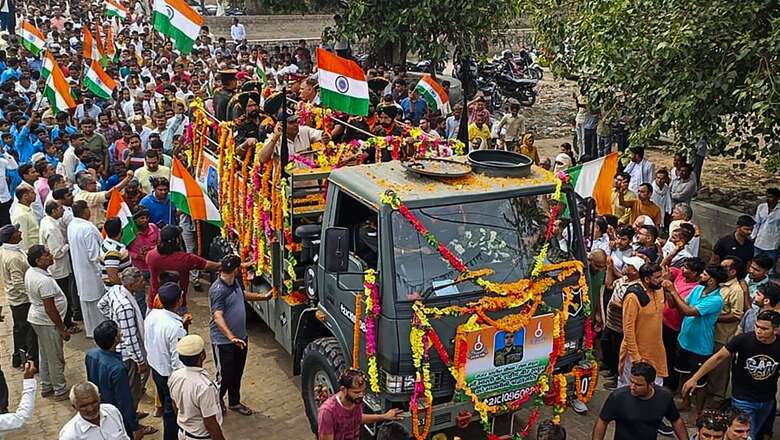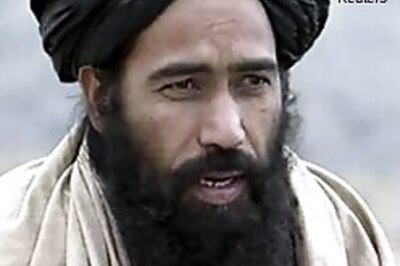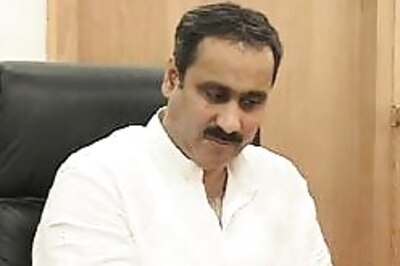
views
Ex facie, the title appears incongruous and even preposterous. But current events confronting the forces in Kashmir and other border areas, is the clandestine armed assaults, being inflicted on them and snuffing out their lives, indiscriminately. A question that is regularly and consistently engaging the minds of patriots is, should we allow our defence and police forces to be cannon fodder for foreign terrorists?
Media is replete with pictures and reports about the heart-wrenching final salute of a six-year-old boy bidding goodbye to his braveheart father who got killed in Kashmir. Two Indian Army officers — Colonel Manpreet Singh and Major Ashish Dhonchak — and DSP Humayun Bhat died during an encounter in Jammu and Kashmir’s Anantnag. The last rites of the martyred soldiers were performed in their respective hometowns and visuals left Indians across the nation tear-eyed.
The six-year-old son of Colonel Manpreet Singh dressed in an Army uniform saluted his father’s mortal remains that were kept in the courtyard of their home at Mullanpur Garibdass in Punjab. “Jai Hind Papa,” said a stoic six-year-old Kabir dressed in army-style fatigues, saluted his father one last time, before Colonel Manpreet Singh, was cremated at his village in Punjab’s Mohali district on September 15. Another painful milestone, in the nation’s fight against terrorism.
Attacks attributed to terrorists, operating from deep inside Pakistan, continue to remain at high levels. Combating cross-border violence, intelligence sharing, and regional cooperation will remain a mirage as long as Pakistan exists. It remains a nation of undying enmity and abject perfidy, a gangster-nation. It has been consistently dismissing diplomacy, negotiations, agreements, and dialogues; Pakistan prefers to remain a consistent critical threat to India.
Pakistan’s Afzal Khan-style personality in its dealings with India, needs a Maratha warrior-king Chhatrapati Shivaji Maharaj-like approach from India. Pakistan has remained a fundamentally dishonest nation, ever since its inception, while India’s democratic structures, processes and attitudes, on which its governance, policy and security depends, are inherently fragile and weak. A Washington think tank, The Diplomat, categorises Pakistan as the seventeenth least stable country on earth (bracketed by such brittle entities as Burundi and Eritrea). But it is believed to have about 140 nuclear weapons, and the world’s fastest-growing nuclear stockpile. It is this nuclear backbone that makes it relentlessly hostile, extravagantly militarised, and ironically, self-consciously destitute. For decades it has been planning a hostile takeover of Kashmir, aided and abetted by highly radicalised terrorists, and supported by corrupt political families in the Valley.
Most unfortunately, the Indian judiciary has not made any effort to understand the game of cross-border terrorism, drug trafficking and arms trafficking. Hence the supreme confidence of terror lobbies, their sympathisers, financiers, and supporters, that a disconnected judiciary can be easily convinced by a midnight knock, by a coterie of ‘senior lawyers’, to deliver favourable verdicts. Nobody is there to deliver a midnight knock for the Army and police personnel, dying every day, trying to defend their motherland.
That brings us to the topic of why the government has not been able to explain the nuts and bolts of terrorism, and counter-terrorism, not only to the judiciary, but also to the bureaucracy, legislature, and the media. Judicial pronouncements have been frequently viewed as disconnected from the anti-terror drive of the forces. Tight border security, if not maintained, can be profoundly toxic to every organ of the government. Pakistan seems to be teaching us an everyday lesson that our border security is lacking in belligerence, and that the judiciary also needs to have an aggressive commitment to dismantle terror structures.
Judicial orders relating to terrorism need to vibe with the requirements of intelligence and security professionals. It should not view the operational consequences of the security forces as violating human rights, but take a positive view and strive to uphold with full judicial might, the actions of the government, the defence and police forces, to keep Indians safe. Judicial pronouncements should reflect clear understanding and rejection of terror philosophy and activities. For this purpose, it needs to seek amicus comments from security professionals, and judgements need to express the continuing concerns of the nation. The judiciary, legislature and bureaucracy need to understand that death at the hands of foreign terrorists is not a special tariff to be paid by forces engaged in anti-terror operations in Kashmir.
The government, on its part, should educate, to borrow an American term, the “belowdecks” (new recruits and younger officers) and “abovedecks” (mid-level and senior officers) in the judiciary, legislature, bureaucracy, and the media about the complexity of anti-terror operations, and the corrosive effects of uncontrolled terrorism. The judiciary needs to understand that every verdict it delivers in cases related to terrorism, narcotics trafficking and arms trafficking, should be a guard-rail defending the nation, not decisions that leave the forces beleaguered.
The writer is a retired officer of the IRS and the former director-general of the National Academy of Customs, Indirect Taxes & Narcotics. Views expressed in the above piece are personal and solely that of the author. They do not necessarily reflect News18’s views.



















Comments
0 comment